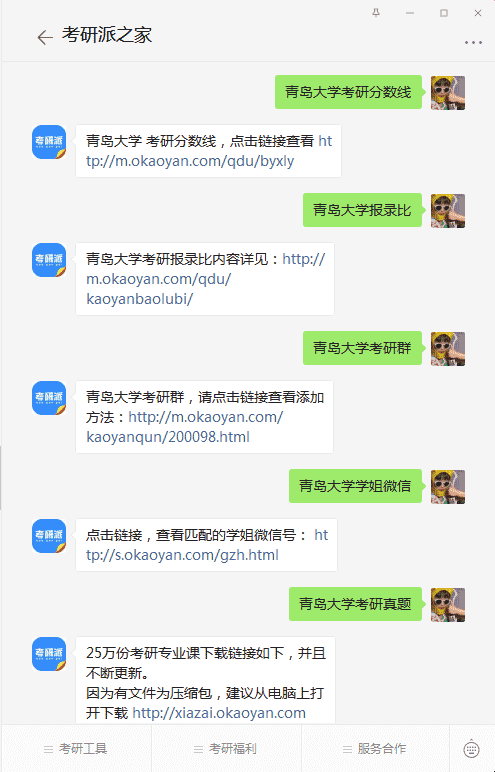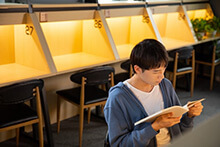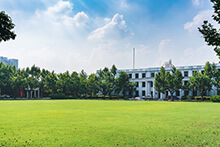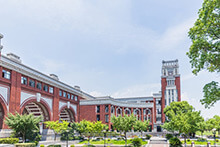青岛大学护理学院简介 正文
护理学院是青岛大学的34个学院之一。学院成立于2000年12月,现有教职工26人,其中专业教师18人,专任教师中教授1人,副教授6人,博士4人,博士在读6人。全日制在校生578人,其中本科生 487人,硕士研究生89人,博士研究生3人。自建院以来,护理学院传承和发扬了历代护理人“仁爱、励志、严谨、求实”的理念和精神,立足改革促发展,凝心聚力创一流,经过十几年的努力,护理学院实现了办学层次从专科--本科—护理一级学科学位硕士授权点--护理学一级学科博士授权点—护理学博士后科研流动站的稳步提升,实现了学科的飞速发展。
青岛大学的护理教育历史可以追溯至1946年的国立山东大学高级护士学校,是中国较早开办护理教育的院校之一。后来护士学校历经变迁,成为医学院附属医院护士学校。护理的高等教育起步于1993年医学院成立的护理系,1995年开始招收护理专科生,1998年开始护理本科教育。2000年12月,在护理系和附属医院护士学校的基础上,合并组建护理学院。2003年获批护理学硕士学位授权点,2010年获批护理硕士专业学位授权点,2011年获批护理学一级学科博士学位授权点,2012年获批护理学博士后科研流动站。依托学校悠久的办学历史、良好的办学条件和丰富的办学经验,目前已经建立了从本科到博士,涵盖全日制和成人教育各个层次和类别,相对完善的护理人才培养体系,已成为全国为数不多、办学层次齐全的培养高级护理人才的高等学校。培养了大批高级护理人才,在国内外享有一定的声誉。
学院设有成人护理教研室、基础护理教研室、妇女儿童护理教研室、老年社区护理教研室、护理人文教研室、临床护理教研室六个教研室和一个护理学实验中心。拥有一支“专、兼”结合的“双师型”教师队伍,师资力量雄厚,人员结构合理,学历层次较高,专职教师中,已有博士研究生4名、在读博士研究生6名,学院将继续加大博士等高层次人才的引进力度,努力打造治学严谨、教学与科研能力较强、在国内护理学界具有一定影响力的教师团队。
学院在护理人才培养过程中始终坚持育人以学生为本,办学以教师为本,不断深化教育教学改革,探索“通识+专业+临床”的护理人才培养模式,取得了较为丰硕的教育教学改革成果。建成校级精品课程1门、省级精品课程4门,获得山东省本科应用型人才培养专业发展支持计划项目。
学院按照“建平台、育团队、出成果”的工作思路,鼓励教师积极申报各类科研课题,加强科研团队建设,鼓励教师间的科研合作,培育形成较高水平的科研创新团队,提高教师科研能力和水平。近几年,护理学院共承担科研项目20余项,获得各级科研奖励8项,发表论文300余篇,主编或参编著作14部。教师参编国家级规划教材10余人次,其它类教材20余人次。
学院构建了“实验-见习-实习”实践教学体系,拥有丰富的临床资源和雄厚的教学科研条件,包括7所附属医院、5所教学医院、1个护理教学实验中心、1个临床技能培训中心。其中青岛大学附属医院、青岛市立医院、青岛大学第二附属医院、青岛妇女儿童医疗中心、附属烟台毓璜顶医院等均具有三级甲等医院资质,2015年新增北京协和医院为临床实习基地。学院还将继续开辟更多知名的医院为临床教学实践基地,充分利用这些三级甲等综合性教学医院集医疗、教学、科研、预防保健和康复为一体的区域医疗中心的资源优势,为培养具有国际视野和创新精神的护理人才提供保障。
学院注重学生综合素质的培养,发挥护理教育中的学科优势,在教学中注重社会、心理、人文知识的拓展,注重临床思维和评判性思维的培养,全面提升学生的综合素质。学生参加国家护士职业资格考试通过率100%,优秀率85%以上,本科生一次性就业率达到95%以上,研究生一次性就业率100%。很多毕业学生已经成为医院护理战线和护理院校的骨干力量,得到社会用人单位的广泛认可。护理专业人才培养在山东半岛起到了良好的示范和辐射带动作用。
School of Nursing is one of the 34 schools at Qingdao University. The school was established in December 2000. There are 26 staffs working at the school, with 18 professional teachers. Among the teachers, there is one professor, six associate professors, four teachers with doctorate degree, and six teachers being doctoral candidates. There are 578 full-time students, including 487 undergraduates, 89 master students and 3 doctoral students. Since its establishment, School of Nursing inherits and carries forward the ideology and spirits of ‘benevolence, inspiration, rigor and pragmatism’. Based on the notion of reform promoting development and working together for excellence, the school has achieved rapid development in education structure, manifesting by an upgrading in program from diploma, bachelor, to professional master degree program in nursing as a first-level discipline, to doctorate degree program in nursing as a first-level discipline and postdoctoral research institute on nursing.
The history of nursing education at Qingdao University can be traced back to the Advanced Nursing School at National Shandong University founded in 1946, which was one of the first institutions launching nursing education programs in China. Later, the Nursing School became affiliated hospital of medical college based school of nursing. The higher nursing education started from the nursing department in medical college in 1993. It started to enroll junior college students from 1995 and started undergraduate nursing education in 1998. In December 2000, the nursing department and hospital-based school were combined to establish the School of Nursing. In 2003, the school was authorized to start master degree program in 2003 and professional master degree program was approved in 2010. In 2011, the school was authorized to start doctorate degree program in nursing as a first-level discipline. In 2012, the school was approved to set up the postdoctoral research institute on nursing. Relying on the long history, resource and experience of education at Qingdao University, currently the school has formed a relatively sound personnel training and cultivation system, with full-time and continuing education at different levels such as bachelor and doctorate degree. The school has good reputation for cultivating a large number of qualified nursing graduates who contribute to the health care for people.
There are one nursing experimental and practice center and six teaching & research departments, i.e., continuing education, fundamental nursing, gynecological and pediatric nursing, gerontological nursing, humanistic nursing, and clinical nursing. The teaching team in School of Nursing is ‘double division type’, consisting of full-time and part-time teachers with higher education background. Four full-time teachers have obtained the doctorate degree and six teachers are currently enrolled in doctorate degree programs. The school will continue to make efforts to attract academics with higher degrees to improve the capability of teaching and research, and strengthen its influence in the nursing field.
The school insists on student-centered education and teacher-based schooling. Through deepening the educational and teaching reform, and applying the model of a combination of general-specialized-clinical courses, the school has achieved positive outcomes. There are four courses being granted as provincial exquisite course and one granted as university exquisite course. A project entitled with application-oriented undergraduate cultivation and professional development support was funded by Shandong Province.
With the notion of ‘building platforms, forming teams, and making achievements’, the school encourages teachers to apply for research projects from various sources and cooperate with each other to strengthen the building of research teams and improve the academics’ research abilities. In recent years, the school was granted over 20 research projects and eight awards for research. The staff published over 300 journal articles and edited 14 books as chief-editors or chapter authors. The staff participated in compiling the national planning textbooks over 10 person-times and other types of teaching materials over 20 person-times.
The school constructed a teaching and practice pattern of ‘experiment- observation-internship’. The school has a wide range of clinical and teaching/research resources, including seven affiliated hospitals, five teaching hospitals, one nursing teaching and experimental center, and one clinical skill training center. Among the affiliated and teaching hospitals, the Affiliated Hospital of Qingdao University, Qingdao Municipal Hospital, the Second Affiliated Hospital of Qingdao University, Qingdao Women and Children Healthcare Center, and the affiliated Yantai Yuhuangding Hospital are tertiary hospitals. In 2015, the Peking Union Medical College Hospital agreed to be a clinical practice base for our students. In future, the school will continue to cooperate with more tertiary hospitals as the clinical teaching and practice bases to set a basis for cultivating nursing talents with international vision and innovative spirits.
The school highlights improving students’ comprehensive qualities. Drawing on the strengths of nursing discipline, we emphasize expanding students’ knowledge in sociology, psychology and humanities, and training their critical thinking in nursing education. The students take the national nursing practicing qualification examination with a 100% passing rate and 85% excellence rate. The employment rate of undergraduates is over 95% and 100% for the postgraduates. Many graduates are the backbone of the nursing staff in hospital and nursing schools, and are well recognized by their institutions. The cultivation of nursing professionals at Qingdao University School of Nursing plays an important exemplary and leading role in Shandong Peninsula.
青岛大学
添加青岛大学学姐微信,或微信搜索公众号“考研派小站”,关注[考研派小站]微信公众号,在考研派小站微信号输入[青岛大学考研分数线、青岛大学报录比、青岛大学考研群、青岛大学学姐微信、青岛大学考研真题、青岛大学专业目录、青岛大学排名、青岛大学保研、青岛大学公众号、青岛大学研究生招生)]即可在手机上查看相对应青岛大学考研信息或资源。


本文来源:
http://www.okaoyan.com/qdu/yanjiushengyuan_279076.html 




















































































